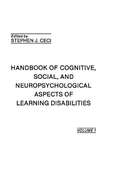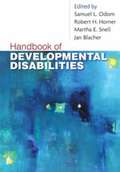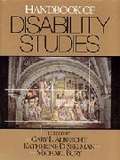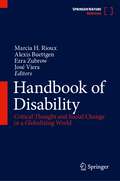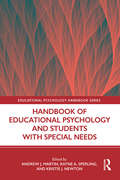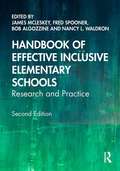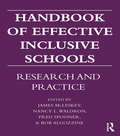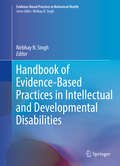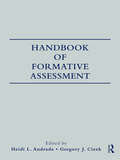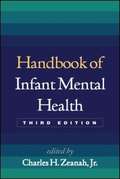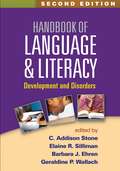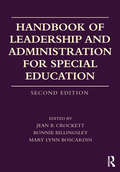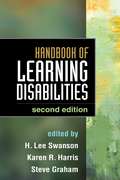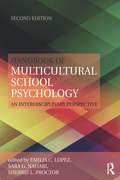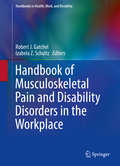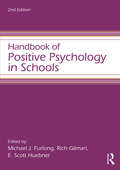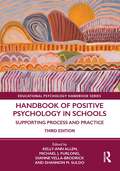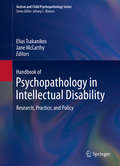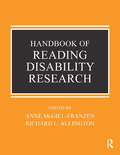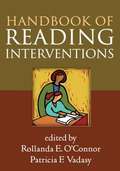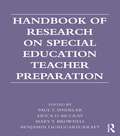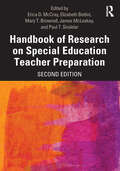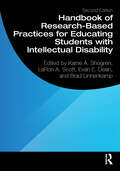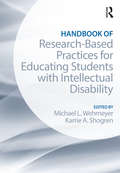- Table View
- List View
Handbook of Cognitive, Social, and Neuropsychological Aspects of Learning Disabilities: Volume I
by Stephen J. CeciRecognized as the definitive reference in the field, this book addresses a broad range of biologically based disorders that affect children's learning and development. Leading authorities review the genetics of each disorder; its course and outcome; associated developmental, cognitive, and psychosocial challenges; and what clinicians and educators need to know about effective approaches to assessment and intervention. Coverage encompasses numerous lower-incidence neurodevelopmental disabilities as well as more frequently diagnosed learning and behavior problems with a genetic component.
Handbook of Developmental Disabilities
by Martha E. Snell Samuel L. Odom Robert H. Horner Jan BlacherIn this reprint from 2007, Odom (child development, U. of North Carolina at Chapel Hill) et al. bring together 30 chapters reviewing current knowledge about different dimensions of developmental disabilities, neuroscientific and genetic foundations, impacts on health, learning, and behavior, and educational and clinical practices. Scholars of education, human development, psychiatry, psychology, learning disabilities, and other areas, who are based in North America and the UK, discuss definition and classification issues, social policy, research methods, cultural influences, and established and new approaches to promoting communication and language abilities, academic skills, positive social interactions, vocational and independent living skills, and positive behavior support, family adaptation, and resilience with children and adults. Other topics include dual diagnosis, pharmacological and behavioral treatments, families, and international perspectives and practices. Annotation c2009 Book News, Inc., Portland, OR (booknews.com)
Handbook of Disability Studies
by Gary L. Albrecht Katherine D. Seelman Michael BuryDrawing on the insights of disability scholars around the world and the creative advice of an international editorial board, this book engages the reader in the critical issues and debates framing disability studies and places them in an historical and cultural context. Five years in the making, this one volume summarizes the ongoing discourse ranging across continents and traditional academic disciplines.
Handbook of Disability: Critical Thought and Social Change in a Globalizing World
by Ezra Zubrow Marcia H. Rioux Alexis Buettgen José VieraThis important reference work maps the terrain of disability across the world by providing an overview of issues, concerns and developments in the domains of society, culture, medicine, law, policy, justice, education, economics, and science and technology. It is a truly inclusive volume bringing together perspectives from researchers, activists, professionals, service providers, international development experts and policymakers based in the global North and South, and it particularly focuses on the voices of the principal stakeholders---disabled persons themselves. Working from an interdisciplinary matrix, this book reviews historical developments, contemporary practices and policies . It addresses hitherto unchartered areas in the disability discourse that will be significant in the years to come. In the modern world, the social and medical responses to disability have been separation, segregation and incarceration of disabled people. These responses are reflected in practices of special education, building of asylums, medical classifications and sheltered employment. Current thinking on disability is based on the need to overcome such segregation through the enactment of human rights and socially just programmes, policies and laws such as inclusive education, affirmative action, reasonable accommodation, and supported decision-making. This book explores:· The evolution of the concept of disability over space and time and identifies approaches to disability, debility, equality and equity;· Broad trends in research on disability across the world;· New directions in work on disability;· The emergence of a global disability movement and its etiology;· Intersections of disability with other demographic variables like gender, race, caste, and age; and· Historical and socio-economic interfaces with colonialism, globalization, and social development. Spread over14 sections and spanning more than 80 chapters, this volume is the most comprehensive, up-to-date reference work available on the subject.
Handbook of Educational Psychology and Students with Special Needs (Educational Psychology Handbook)
by Andrew J. Martin Kristie Newton Rayne SperlingHandbook of Educational Psychology and Students with Special Needs provides educational and psychological researchers, practitioners, policy-makers, and graduate students with critical expertise on the factors and processes relevant to learning for students with special needs. This includes students with attention-deficit/hyperactivity disorder, other executive function difficulties, behavior and emotional disorders, autism spectrum disorder, intellectual disabilities, learning disabilities, dyslexia, language and communication difficulties, physical and sensory disabilities, and more. With the bulk of educational psychology focused on "mainstream" or "typically developing" learners, relatively little educational psychology theory, research, measurement, or practice has attended to students with "special needs." As clearly demonstrated in this book, the factors and processes studied within educational psychology—motivation and engagement, cognition and neuroscience, social-emotional development, instruction, home and school environments, and more—are vital to all learners, especially those at risk or disabled. Integrating guidance from the DSM-5 by the American Psychiatric Association and the International Classification of Diseases (ICD-10) by the World Health Organization, this book synthesizes and builds on existing interdisciplinary research to establish a comprehensive case for effective psycho-educational theory, research, and practice that address learners with special needs. Twenty-seven chapters by experts in the field are structured into three parts on diverse special needs categories, perspectives from major educational psychology theories, and constructs relevant to special needs learning, development, and knowledge building.
Handbook of Effective Inclusive Elementary Schools: Research and Practice
by James McLeskeyNow in its Second Edition, this seminal handbook offers a comprehensive exploration of how students with disabilities might be provided classrooms and schools that are both inclusive and effective. With an enhanced focus on the elementary level, this new edition provides readers with a richer, more holistic understanding of how inclusive settings operate in K-5, featuring expanded chapters on principal engagement, teacher preparation, district-level support, school-based improvement practices, and more. Fully revised and updated to reflect changes in the field, each chapter synthesizes the research, explores if and how this knowledge is currently used in schools, and addresses the implications for practice and directions for future research.
Handbook of Effective Inclusive Schools: Research and Practice
by Bob Algozzine Fred Spooner James McLeskey Nancy L. WaldronOver the last decade, the educational context for students with disabilities has significantly changed primarily as a result of mandates contained in NCLB and IDEA. The purpose of this book is to summarize the research literature regarding how students might be provided classrooms and schools that are both inclusive and effective. Inclusive schools are defined as places where students with disabilities are valued and active participants in academic and social activities and are given supports that help them succeed. Effectiveness is addressed within the current movement toward multi-tiered systems of support and evidence-based practices that meet the demands of high-stakes accountability.
Handbook of Evidence-Based Practices in Intellectual and Developmental Disabilities
by Nirbhay N. SinghThis handbook presents a diverse range of effective treatment approaches for individuals with intellectual and developmental disabilities (IDD). Its triple focus on key concepts, treatment and training modalities, and evidence-based interventions for challenging behaviors of individuals with IDD provides a solid foundation for effective treatment strategies, theory-to-implementation issues, and the philosophical and moral aspects of care. Expert contributions advocate for changes in treating individuals with intellectual and developmental disabilities by emphasizing caregiver support as well as respecting and encouraging client autonomy, self-determination, and choice. With its quality-of-life approach, the handbook details practices that are person-centered and supportive as well as therapeutically sound. Topics featured in the handbook include: Functional and preference assessments for clinical decision making. Treatment modalities from cognitive behavioral therapy and pharmacotherapy to mindfulness, telehealth, and assistive technologies. Self-determination and choice as well as community living skills. Quality-of-life issues for individuals with IDD. Early intensive behavior interventions for autism spectrum disorder. Skills training for parents of children with IDD as well as staff training in positive behavior support. Evidence-based interventions for a wide range of challenging behaviors and issues. The Handbook of Evidence-Based Practices in Intellectual and Developmental Disabilities is a must-have resource for researchers, clinicians, scientist-practitioners, and graduate students in clinical psychology, social work, behavior therapy, and rehabilitation.
Handbook of Formative Assessment
by Heidi L. Andrade Gregory J. CizekFormative assessment has recently become a focus of renewed research as state and federal policy-makers realize that summative assessments have reached a point of diminishing returns as a tool for increasing student achievement. Consequently, supporters of large-scale testing programs are now beginning to consider the potential of formative assessments to improve student achievement. The mission of this handbook is to comprehensively profile this burgeoning field of study. Written by leading international scholars and practitioners, each chapter includes a discussion of key issues that dominate formative assessment policy and practice today, as well as those that are likely to affect research and practice in the coming years. Key features include: Comprehensive – nineteen chapters cover all aspects of formative assessment including classroom assessment, large-scale applications, technological applications, applications for special needs students, K-12 and post-secondary applications, psychometric considerations, case studies, and discussion of alternative assessment formats such as portfolios and performance assessments. Integrative – thoughtful attention is given to the integration of large-scale and classroom assessments. Practical – provides practical guidance on how to conduct formative assessments that generate credible information to guide instruction. Global – provides perspectives from leading international scholars and practitioners whose expertise spans diverse settings, student populations, and educational systems. Accessible Style – although grounded in the latest research, the book’s style and tone has been carefully crafted to make it accessible to both the textbook and professional markets. It will also be a critical reference book for researchers in teacher preparation, educational administration, and educational policy studies.
Handbook of Inclusive Education
by Central Board Of Secondary EducationThe Constitution of India emphasizes the importance of equality of status and opportunity for all citizens, and institutions like CBSE have a duty to support and inspire every child to succeed. In order to promote inclusivity in schools and ensure that children with special needs are accommodated, CBSE has made it mandatory for schools to provide disability-specific learning aids, alternate pedagogies, and exam concessions. To disseminate accurate information on these provisions, CBSE has created a handbook for teachers that provides guidance on identifying children with special needs, creating a barrier-free environment, using instructional designs and assistive technologies, and conducting assessments. While the handbook follows a generic approach, it can be adapted to suit the needs of different contexts and target groups. CBSE believes that the tools and techniques outlined in the handbook will be useful for teachers and will increase access, equity, and participation of all children in the learning process.
Handbook of Infant Mental Health
by Charles H. ZeanahWidely regarded as the standard reference in the field, this state-of-the-art Handbook offers a comprehensive analysis of developmental, clinical, and social aspects of mental health from birth to the preschool years. Leading authorities explore models of development; biological, family, and sociocultural risk and protective factors; and frequently encountered disorders and disabilities. Evidence-based approaches to assessment and treatment are presented, with an emphasis on ways to support strong parent-child relationships. The volume reviews the well-documented benefits of early intervention and prevention and describes applications in mental health, primary care, childcare, and child welfare settings. The chapter on psychopharmacology has been updated for the paperback edition.
Handbook of Language and Literacy, Second Edition
by Elaine R. Silliman C. Addison Stone Barbara J. Ehren Geraldine P. WallachAn acclaimed reference that fills a significant gap in the literature, this volume examines the linkages between spoken and written language development, both typical and atypical. Leading authorities address the impact of specific language-related processes on K-12 literacy learning, with attention to cognitive, neurobiological, sociocultural, and instructional issues. Approaches to achieving optimal learning outcomes with diverse students are reviewed. The volume presents research-based practices for assessing student needs and providing effective instruction in all aspects of literacy: word recognition, reading comprehension, writing, and spelling. New to This Edition *Chapters on digital literacy, disciplinary literacy, and integrative research designs. *Chapters on bilingualism, response to intervention, and English language learners. *Incorporates nearly a decade's worth of empirical and theoretical advances. *Numerous prior edition chapters have been completely rewritten.
Handbook of Leadership and Administration for Special Education
by Jean B. Crockett Bonnie Billingsley Mary Lynn BoscardinThe Handbook of Leadership and Administration for Special Education brings together research informing practice in leading special education from preschool through transition into postsecondary settings. The second edition of this comprehensive handbook has been fully updated to provide coverage of disability policy, historical roots, policy and legal perspectives, as well as effective, collaborative, and instructional leadership practices that support the administration of special education. It can be used as a reference volume for scholars, administrators, practitioners, and policy makers, as well as a textbook for graduate courses related to the administration of special education.
Handbook of Learning Disabilities, Second Edition
by Steve Graham Karen R. Harris H. Lee SwansonWidely regarded as the standard reference in the field, this comprehensive handbook presents state-of-the-art knowledge about the nature and classification of learning disabilities (LD), their causes, and how individuals with these difficulties can be identified and helped to succeed. Best practices are described for supporting student performance in language arts, math, and other content areas. Contributors also identify general principles of effective instruction and review issues in service delivery within response-to-intervention (RTI) frameworks. The book critically examines the concepts and methods that guide LD research and highlights important directions for future investigation. New to This Edition: *Incorporates key advances in identifying and remediating LD, with particular attention to the role of RTI. *Chapters on social cognitive, behavioral genetic, and neurobiological aspects. *Chapters on adolescents and adults with LD. *Chapters on spelling instruction, history instruction, and classroom technology applications. *Chapter synthesizing 21st-century advances in LD research methods, plus chapters on advanced statistical models, single-case designs, and meta-analysis.
Handbook of Multicultural School Psychology: An Interdisciplinary Perspective (Consultation, Supervision, and Professional Learning in School Psychology Series)
by Emilia C. Lopez Sara G. Nahari Sherrie L. ProctorThe second edition of the Handbook of Multicultural School Psychology continues the mission of its predecessor, offering a comprehensive, interdisciplinary view of the field of multicultural school psychology and addressing the needs of children and families from diverse cultural backgrounds. The revised organizational structure includes the following: History and Professional Issues; Consultation and Collaboration; Interventions Focused on Academic and Mental Health Issues; Data-based Decision Making; Systems-based Issues; Training and Research; and Future Perspectives. Nineteen of the volume's twenty-three chapters are completely new to this edition, while the rest have been effectively revised and updated. Comprehensive—In seven sections, this book covers theoretical, research, and practical concerns in a wide range of areas that include multicultural and bilingual issues, second language acquisition, acculturation, parent collaboration, research, and systemic issues. Chapter Structure—Chapter authors follow a uniform structure that includes theoretical and research issues and implications for practice. Recent practice and training guidelines including Blueprint for Training and Practice III (2006), NASP Model for Comprehensive and Integrated School Psychological Services (2010), and APA Multicultural Guidelines (2003) are covered. Interdisciplinary Perspective—Contributing authors are from a wide range of related fields that include school psychology, special education, general education, early childhood education, educational psychology, clinical psychology, counseling, and mental health, thus exposing readers to theory and research from various approaches. Changes—New to this edition is a section focusing on systemic issues such as overrepresentation of culturally and linguistically diverse (CLD) students in special education, prejudice, response to intervention (RTI) for CLD students and English Language Learners (ELL), and end-of-chapter discussion questions. This book is ideal for graduate courses and seminars on multicultural school psychology. It is also a useful reference for researchers and practicing school psychologists and the libraries that serve them.
Handbook of Musculoskeletal Pain and Disability Disorders in the Workplace
by Izabela Z. Schultz Robert J. GatchelThis book addresses the complexity of preventing, diagnosing, and treating musculoskeletal pain and disability disorders in the workplace. Divided evenly between common occupational pain disorders, conceptual and methodological issues, and evidence-based intervention methods, this comprehensive reference presents current findings on prevalence, causation, and physical and psychological aspects common to these disorders. Attention is given to working-world concerns, including insurance and compensation issues and AMA guidelines for disability evaluations. Also, specialized chapters offer lenses for understanding and administering the best approaches for treating specific pain disorders, and explore what workplaces can do to accommodate affected employees and prevent injuries from occurring in the first place.
Handbook of Positive Psychology in Schools: Supporting Process And Practice (Educational Psychology Handbook)
by Michael J. Furlong Rich Gilman E. Scott HuebnerUnderstanding the factors that encourage young people to become active agents in their own learning is critical. Positive psychology is one lens that can be used to investigate the factors that facilitate a student’s sense of agency and active school engagement. In the second edition of this groundbreaking handbook, the editors draw together the latest work on the field, identifying major issues and providing a wealth of descriptive knowledge from renowned contributors. Major topics include: the ways that positive emotions, traits, and institutions promote school achievement and healthy social and emotional development; how specific positive-psychological constructs relate to students and schools and support the delivery of school-based services; and the application of positive psychology to educational policy making. With thirteen new chapters, this edition provides a long-needed centerpiece around which the field can continue to grow, incorporating a new focus on international applications of the field.
Handbook of Positive Psychology in Schools: Supporting Process and Practice (Educational Psychology Handbook)
by Kelly-Ann AllenThe Handbook of Positive Psychology in Schools offers the most current and comprehensive insights into how positive psychology principles provide a framework for young people to become active agents in their own learning. The third edition of this groundbreaking volume assembles the latest global research identifying fundamental assets—hope, optimism, gratitude, self-efficacy, emotional regulation, among others—that support students’ learning and well-being. Chapters examining social-ecological perspectives on classroom quality and school climate provide best practice guidance on schoolwide policies and practices. These 35 new chapters explore positive psychology’s ongoing influence and advances on prevention, intervention, and assessment practices in schools.
Handbook of Psychopathology in Intellectual Disability
by Jane Mccarthy Elias TsakanikosThe complex intersecting of genetic, biological, and environmental factors can make intellectual impairments difficult for clinicians to assess and treat. When such comorbid conditions as substance abuse or bipolar disorder are part of the equation, so are increased risks for clinical uncertainties and therapeutic dead-ends. The Handbook of Psychopathology in Intellectual Disability reflects the diversity of its subject in prevalence and presentation, testing methods and treatment options. Besides focusing on specific pathologies as they affect the course of intellectual disability (ID), its coverage spans the field from in-depth analyses of psychosocial aspects of ID to promising new findings in genetics and the ongoing challenge of providing personalized care tailored to individual client needs. Expert contributors bridge gaps between the evidence base and best practices and improved policy for maximum utility. In addition, chapters are written to benefit the widest variety of professionals treating clients with ID across disciplines. Key areas featured in the Handbook include: General issues and assessment methods. Core etiological approaches, including neuroimaging. Comorbid psychopathology, including mood, anxiety, and personality disorders. Common clinical conditions, such as ADHD, autism, and behavior problems. Medical and psychological interventions as well as community and inpatient services. Future directions in research and evidence-based practices. The Handbook of Psychopathology in Intellectual Disability is an essential reference for researchers, professors, and graduate students as well as clinicians and other scientist-practitioners in clinical psychology, psychiatry, social work, rehabilitation medicine, public health, and neuropsychology.
Handbook of Reading Disability Research
by John Elkins William Rupley Richard L. Allington S. Jay Samuels Victor L. Willson Anne McGill-Franzen George Hruby Peter Johnston Susan Hupp Victoria Risko Patricia AndersBringing together a wide range of research on reading disabilities, this comprehensive Handbook extends current discussion and thinking beyond a narrowly defined psychometric perspective. Emphasizing that learning to read proficiently is a long-term developmental process involving many interventions of various kinds, all keyed to individual developmental needs, it addresses traditional questions (What is the nature or causes of reading disabilities? How are reading disabilities assessed? How should reading disabilities be remediated? To what extent is remediation possible?) but from multiple or alternative perspectives. Taking incursions into the broader research literature represented by linguistic and anthropological paradigms, as well as psychological and educational research, the volume is on the front line in exploring the relation of reading disability to learning and language, to poverty and prejudice, and to instruction and schooling. The editors and authors are distinguished scholars with extensive research experience and publication records and numerous honors and awards from professional organizations representing the range of disciplines in the field of reading disabilities. Throughout, their contributions are contextualized within the framework of educators struggling to develop concrete instructional practices that meet the learning needs of the lowest achieving readers.
Handbook of Reading Interventions
by Patricia Vadasy Rollanda O'ConnorComprehensive, authoritative, and designed for practical utility, this handbook presents evidence-based approaches for helping struggling readers and those at risk for literacy difficulties or delays. Leading experts explain how current research on all aspects of literacy translates into innovative classroom practices. Chapters include clear descriptions of effective interventions for word recognition, spelling, fluency, vocabulary, comprehension, and writing, complete with concrete examples and teaching scripts. Coverage also encompasses preschool literacy instruction and interventions for older readers, English language learners, and students with learning disabilities, as well as peer-mediated and tutoring approaches.
Handbook of Research on Special Education Teacher Preparation
by Paul T. Sindelar Mary T. Brownell Erica D. McCray Benjamin Lignugaris KraftCompilations of research on teacher preparation often include no more than a cursory mention of the specific roles and needs of special education teachers. Although the work that special education teachers perform does indeed differ from the work of classroom teachers, teacher preparation in the two fields has much in common. The purpose of this seven-part handbook is to expand our knowledge of teacher education broadly by providing an in-depth look at the most up-to-date research on special education teacher preparation. Opening chapters ground the collection in political and economic context, while subsequent sections delve deeply into issues related to the current state of our special education workforce and offer insights into how to best prepare and sustain that workforce. Ultimately, by illuminating the particularities of special education teacher preparation, this landmark handbook addresses the state of current research in the field and sets an agenda for future scholarship.
Handbook of Research on Special Education Teacher Preparation
by Paul T. Sindelar Mary T. Brownell James McLeskey Erica D. McCray Elizabeth BettiniThe new edition of this landmark text expands our current understanding of teacher education broadly by providing an in-depth look at the most up-to-date research on special education teacher preparation. Offering a comprehensive review of research on attracting, preparing, and sustaining personnel to effectively serve students with disabilities, it is fully updated to align with current knowledge and future perspectives on special educator development, synthesizing what we can do to continue advancing as a field. The Handbook of Research on Special Education Teacher Preparation is a great resource not only to special education faculty and the doctoral students they prepare, but also to scholars outside of special education who address questions related to special education teacher supply, demand, and attrition.
Handbook of Research-Based Practices for Educating Students with Intellectual Disability
by Karrie A. Shogren LaRon A. Scott Evan E. Dean Brad LinnenkampNow in its second edition, this comprehensive handbook emphasizes research-based practices for educating students with intellectual disability across the life course, from early childhood supports through the transition to adulthood.Driven by the collaboration of accomplished, nationally recognized professionals of varied approaches, lived experience and expertise, and philosophies, the book is updated with new theory and research-based practices that have been shown to be effective through multiple methodologies, to help readers select interventions and supports based on the evidence of their effectiveness. Considering the field of intellectual disability from a transdisciplinary perspective, it integrates a greater focus on advancing equity in educational outcomes for students.This book is a professional resource and graduate level text for preservice and in-service educators, psychologists, speech/language therapists and other clinicians involved in the education of children, youth, and adults with intellectual disability.
Handbook of Research-Based Practices for Educating Students with Intellectual Disability
by Michael L. Wehmeyer Karrie A. ShogrenThe Handbook of Research-Based Practices for Educating Students with Intellectual Disability provides an integrated, transdisciplinary overview of research-based practices for teaching students with intellectual disability. This comprehensive volume emphasizes education across life stages, from early intervention in schools through the transition to adulthood, and highlights major educational and support needs of children and youth with intellectual disability. The implications of history, recent research, and existing information are positioned to systematically advance new practices and explore promising possibilities in the field. Driven by the collaboration of accomplished, nationally recognized professionals of varied approaches and philosophies, the book emphasizes practices that have been shown to be effective through multiple methodologies, so as to help readers select interventions based on the evidence of their effectiveness.
